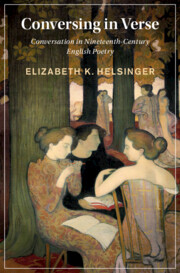Book contents
- Conversing in Verse
- Cambridge Studies in Nineteenth-Century Literature and Culture
- Conversing in Verse
- Copyright page
- Contents
- Figures
- Acknowledgments
- Chapter 1 Introduction: A Poetics of Encounter
- Chapter 2 Dialogue and the Idyll: Tennyson and Landor
- Chapter 3 Performing Conversation: Swinburne and Robert Browning
- Chapter 4 Projects of Animation: Coleridge and Clare
- Chapter 5 Ecphrastic Questions: Dante Gabriel Rossetti and Michael Field
- Chapter 6 Cruel Intimacies: Christina Rossetti and Thomas Hardy
- Epilogue
- Notes
- Bibliography
- Index
- Cambridge Studies in Nineteenth-Century Literature and Culture
Chapter 2 - Dialogue and the Idyll: Tennyson and Landor
Published online by Cambridge University Press: 21 July 2022
- Conversing in Verse
- Cambridge Studies in Nineteenth-Century Literature and Culture
- Conversing in Verse
- Copyright page
- Contents
- Figures
- Acknowledgments
- Chapter 1 Introduction: A Poetics of Encounter
- Chapter 2 Dialogue and the Idyll: Tennyson and Landor
- Chapter 3 Performing Conversation: Swinburne and Robert Browning
- Chapter 4 Projects of Animation: Coleridge and Clare
- Chapter 5 Ecphrastic Questions: Dante Gabriel Rossetti and Michael Field
- Chapter 6 Cruel Intimacies: Christina Rossetti and Thomas Hardy
- Epilogue
- Notes
- Bibliography
- Index
- Cambridge Studies in Nineteenth-Century Literature and Culture
Summary
Chapter 2 focuses on the idylls of Tennyson and Landor as they explored in verse the conversations of friendship, responding to the difficulties of social relations with other beings by figuring and configuring voices other than themselves to put them – and their readers -- in dialogue with one another. Romantic and Victorian poets turned to the example of the Hellenistic poet Theocritus, whose poetic fictions of conversation and song helped the later poets to imagine something like a Levinasian ethical social order amid political disorder. Following Coleridge, Wordsworth, Keats, and Shelley, Tennyson’s English Idyls and Landor’s Hellenic Idylls took up the ethical and political challenges of conversing across deepening divisions they perceived around them, not only between persons but also between persons and the non-human natural world. Implicit in their efforts is an optimism that later poets, not least an older Tennyson, would find difficult to sustain.
- Type
- Chapter
- Information
- Conversing in VerseConversation in Nineteenth-Century English Poetry, pp. 22 - 54Publisher: Cambridge University PressPrint publication year: 2022

